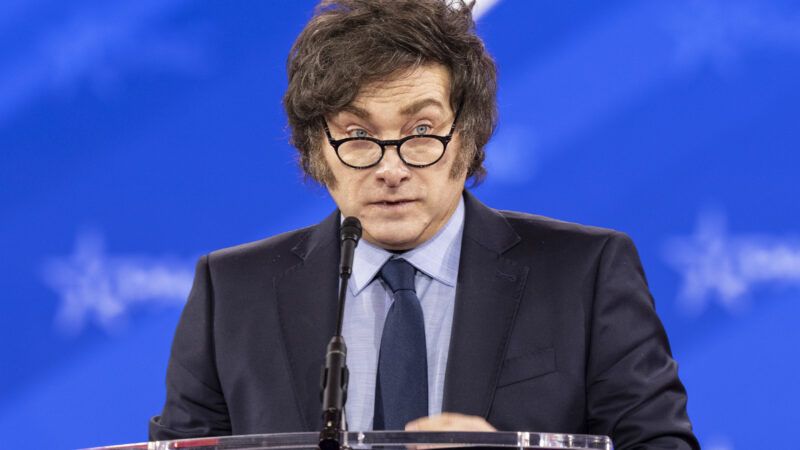Javier Milei's Crypto Scandal
After promoting a crypto token that collapsed in hours, Argentina’s president claims he was deceived.

On February 14, Argentine President Javier Milei shared a link on X promoting a cryptocurrency called $LIBRA. The project, he claimed, will help "foster the growth of the Argentine economy by funding small companies and ventures." Almost immediately, his followers raised the alarm: 84 percent of the crypto's stock was owned by just three wallets, leading many to suspect a "rug pull" scheme—a scam in which a token's value is inflated through celebrity endorsement, only for the original developers to then withdraw all liquidity, leaving the investors with a worthless asset.
Just two hours after Milei's post, $LIBRA acquired around 40,000 investors and its price rose by 1,300 percent. Then, as many predicted, the developers sold all the tokens they retained, crushing its value, and walking away with roughly $113 million. Three out of four investors lost money, with some losing up to $5 million.
Not long after, Milei deleted his original posts, claiming he "wasn't acquainted with the details of the project" and "obviously has no connection" to it. He clarified that his accounts hadn't been hacked, as some had speculated. Milei was left with two options: admit he had been deceived or acknowledge that he had willfully participated in a scam. He chose the former, framing the endorsement as an honest mistake.
Sensing an opportunity, the Peronist Left called for impeachment proceedings, while others filed criminal charges against the president. But the Peronists are fragmented and leaderless: Their key figures are widely unpopular, and none are willing to pick a fight with Milei and capitalize on the scandal. Meanwhile, the centrist parties that occasionally collaborate with Milei introduced a Senate bill to create a special investigative committee. But the bill was struck down by the same senators who proposed it, many of whom remain uncertain whether to align with or oppose a president who shares their voter base and who is leading a painful but necessary economic recovery.
The opposition has remained disoriented since Milei assumed office a little over a year ago. Their lack of a viable alternative, combined with Argentina's economic performance under Milei's liberalizing reforms, has allowed the president to maintain unprecedented popular support. Since his inauguration, Milei has held a net positive approval rating of between 52 and 60 percent, as inflation reaches new monthly lows, the exchange rate remains stable, and the country exits recession. Despite the $LIBRA scandal, Argentina's stock market and international credit ratings remained steady. Milei's party, La Libertad Avanza, is even expecting legislative gains in October, which would allow it to fast-track its reform agenda.
Still, the crypto scandal suggests that Milei's administration may have grown too comfortable. For the first time, his team was on the defensive, facing substantial criticism—even from within his own administration. Hayden Davis, one of $LIBRA's developers, insisted that Milei himself hadn't profited from the token. But that only raised deeper questions: How did this happen, and who was behind it?
In a February 17 interview, Milei admitted he's "still not used to the idea of being president," that it's too easy to approach him, and that he'll need to "erect walls" to filter out fraudsters and prevent future blunders. Former President Mauricio Macri, who chairs the Republican Proposition party, one of Milei's key parliamentary allies, claimed that "President [Milei] is badly advised and not taken care of." Macri has long accused the president's advisers of being unserious and immature.
In the end, the scandal barely dented Milei's popularity—his approval rating dropped just four points. The limited fallout can be attributed to two factors: most of those affected by the scam were outside Argentina, and the incident pales in comparison to the corruption scandals surrounding Milei's rivals. The charge against Milei is being led by two former Peronist presidents: Cristina Kirchner, who faces two corruption sentences, and Alberto Fernández, who was recently indicted for physically assaulting his wife.
Yet the public remains divided. While 39.5 percent of Milei's supporters believe he made an earnest mistake, 49 percent think he acted deliberately. Meanwhile, 77 percent—including 60 percent of his own supporters—believe the incident warrants an investigation. This suggests that Argentines are willing to forgive Milei, but only if he demonstrates accountability and listens when supporters warn him of potential dangers—as they did when he first met with Hayden Davis back in January.
In response to the scandal, the president launched an internal investigation led by the presidency's Anti-Corruption Office. Many believe Milei should reevaluate who's in his inner circle, although he's reticent to do this. It will depend on what information emerges as to who persuaded him to endorse the cryptocurrency. Rumors already point to his tech advisor, Mauricio Novelli, and to others close to the president, including his sister and personal secretary, Karina Milei.
In weathering his first major political storm, Milei faces a critical test of leadership. He now has an opportunity to prove that his opponents have underestimated him, that he can regain control of the narrative, show accountability, and set himself apart from the corrupt practices of Argentina's political establishment. If not, he will have to lay low for a while to protect his people, and salvage his reputation by leaning more on his economic technocrats and moderate allies.


Show Comments (29)